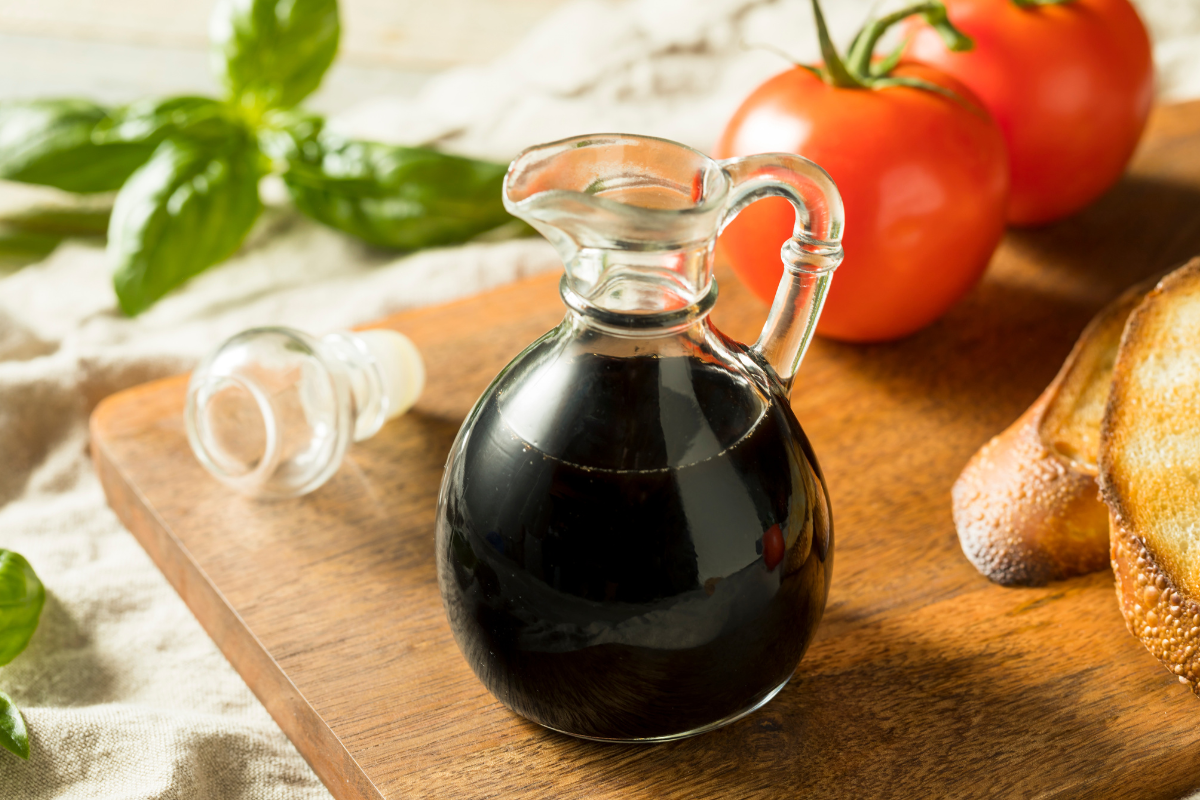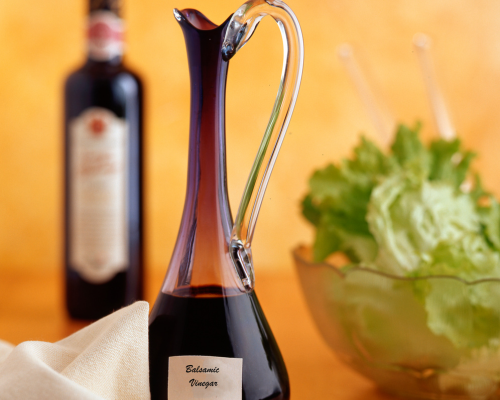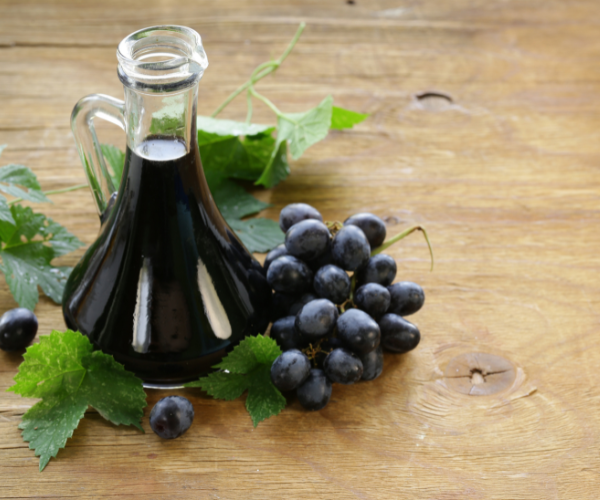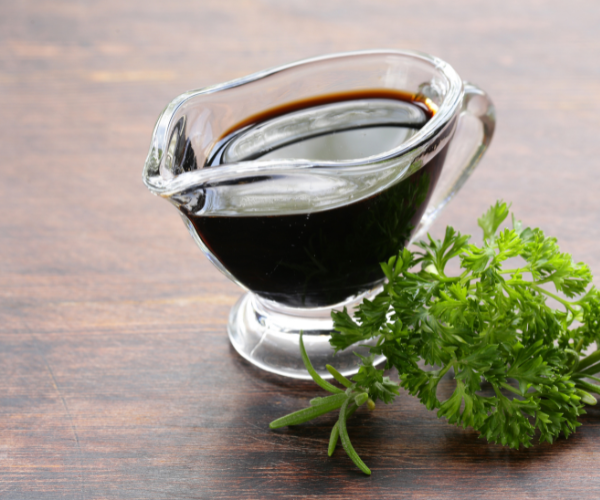Can Dogs Have Balsamic Vinegar? Answered!
Can Dogs Have Balsamic Vinegar? Answered!

Vet Reviewed

By: Sarah Hodgson
June 16, 2023
- Posted in DogsCan Dogs Eat
Table of Contents
You likely used balsamic vinegar in salad dressings, sauces, or even in marinades. However, if you own a dog you know that not all human foods are meant for dogs. So when it comes to balsamic vinegar can dogs eat it?
In this article, we will go over whether balsamic vinegar is safe for dogs and discuss all about it. So don't leave and let's jump in.
What Is Balsamic Vinegar?
For those of you who might not know exactly what balsamic vinegar is, we'll explore every aspect of it before we get into whether dogs can eat it.
Balsamic vinegar is a dark, concentrated, intensely flavored vinegar originating in Italy. It is made from the concentrated juice of white grapes. It is a slightly sweet, dark, richly flavored vinegar used to enhance salad dressings, marinades, and sauces. It can be reduced to a glaze and drizzled over strawberries, stirred into a risotto, or tossed with Brussels sprouts.
How Is Balsamic Vinegar Made?
The process of making balsamic vinegar is unlike any other vinegar.
It begins with freshly harvested grapes, typically Trebbiano or Lambrusco, which are crushed to obtain the grape must. The must is then cooked slowly over an open flame to concentrate the flavors and sugars. After this initial cooking process, the grape must is transferred to wooden barrels.
Once in the barrels, the grape must undergo a lengthy aging process, ranging from a minimum of 12 years to several decades. During this time, the balsamic vinegar develops its complex flavors and acquires its characteristic sweetness. Throughout the aging process, the vinegar is transferred to smaller barrels made of different types of wood to further enhance its taste. The result is a rich and flavorful vinegar that is cherished and enjoyed by many.
Now this is the original method, most bottles of balsamic found in a store don't use the real original method as it takes time and is super expensive. The bottles found in stores are made much quicker.

Can Dogs Eat Balsamic Vinegar?
Can dogs safely have balsamic?
This is a yes and no answer, mainly leaning toward no. While balsamic vinegar may be safe for us humans, it is not recommended for dogs. The acid and grape content it's made of up can lead to various digestive issues and even pancreatitis in dogs. It's best to avoid balsamic vinegar altogether and go for a healthier alternative like apple cider vinegar.
Dogs have different digestive systems and nutritional needs than humans, and certain foods that are considered safe for us can be harmful or toxic to them. Balsamic vinegar falls into this category of being unsafe.
There are times when balsamic vinegar is safe, but most bottles found in the supermarket are unsafe.
When Shouldn't You Feed Balsamic Vinegar to Your Dog?
While balsamic vinegar can be safe for dogs in small quantities, in most situations it is best to avoid feeding it to your dog.
If your dog has a pre-existing health condition, such as diabetes or pancreatitis, the high sugar content in balsamic vinegar can exacerbate these conditions and will just make them worse.
Additionally, if your dog has a sensitive stomach or is prone to digestive issues, it is best to steer clear of balsamic vinegar. The acidity of the vinegar can cause discomfort and gastrointestinal upset in some dogs. If you notice any adverse reactions after feeding your dog balsamic vinegar, such as vomiting or diarrhea, it is important to discontinue its use and consult with your veterinarian.

Risky Ingredients Found In Balsamic Vinegar For Dogs
Balsamic vinegar itself is not typically harmful to dogs in small amounts, but there are certain ingredients and additives that may be found in some commercial balsamic vinegar products that could potentially be risky for dogs.
Grapes
One of the main components is grapes, which are known to be toxic to dogs and can cause kidney failure. Even though the grapes used in the production of balsamic vinegar are concentrated, the risk of toxicity remains
Acidic Content
The acidic and sugary content of balsamic vinegar can be quite harmful to a dog's digestive system. It often contains high levels of sugar and acidity, which can lead to digestive issues, upset stomach, and even pancreatitis in dogs.
Sodium
Some commercial balsamic vinegar products may contain added salt or sodium. While small amounts of salt are generally tolerated by dogs, excessive sodium intake can lead to dehydration, electrolyte imbalances, and other health problems.
Onions or Garlic
Some flavored balsamic vinegars may contain ingredients like onions or garlic, which are toxic to dogs and can cause gastrointestinal irritation, red blood cell damage, and other health issues.
It's best to avoid balsamic vinegar altogether for dogs as these ingredients are indeed risky.
Does Balsamic Vinegar Provide any Benefits For Dogs?
Balsamic vinegar does not really provide any benefits to truly be considered beneficial for dogs.
While balsamic vinegar should be used sparingly and with caution, it does offer some potential benefits to dogs. Due to its antioxidant properties, balsamic vinegar may help combat inflammation and oxidative stress in dogs. Additionally, the acetic acid present in balsamic vinegar may aid in digestion and help regulate blood sugar levels. So I think you get the point now that it should be avoided at all costs.
How Much Balsamic Vinegar Can My Dog Have?
It is best to completely avoid giving your dog any balsamic vinegar as mentioned earlier.
The potential risks and lack of nutritional benefits make it an unnecessary addition to their diet. If your dog accidentally has a small amount of balsamic vinegar, monitor them closely for any signs of illness or discomfort. If you notice any unusual symptoms, contact and visit your veterinarian.
What If My Dog Accidentally Ate Balsamic Vinegar?
If your dog has accidentally consumed balsamic vinegar, in most cases there's nothing to worry about. While small amounts are unlikely to cause severe harm, larger quantities can be problematic.
The first step is to assess the amount of vinegar your dog has ingested and observe any immediate symptoms or reactions.
If your dog has only consumed a small amount and is not displaying any adverse symptoms, you can monitor them closely for the next 24 hours. Ensure they have access to fresh water and a balanced diet to aid in digestion. However, if your dog has ingested a significant quantity or is experiencing severe symptoms, it is crucial to seek veterinary attention immediately.

What Should I Do If My Dog Eats Balsamic Vinegar?
If your dog has ingested a substantial amount of balsamic vinegar or is displaying severe symptoms, it is important to contact your veterinarian right away. They will be able to provide guidance and advise on the necessary steps to ensure your dog's well-being.
In some cases, your veterinarian may recommend inducing vomiting to eliminate any remaining vinegar from your dog's system. However, this should only be done under the guidance of a professional, as inducing vomiting can be dangerous if not performed correctly.
Best Alternative Balsamic Vinegar Option For Dogs
While balsamic vinegar may not be a safe option for dogs, there are alternative vinegar options that can safely be incorporated into their diet. If you are looking for a safe and healthy alternative to balsamic vinegar, there are a few options you can consider. The best being Apple cider vinegar which is often used in dog food and treats due to its potential health benefits. It can help with digestion, a healthy coat, and even repel fleas. However, it is important to use apple cider vinegar in moderation and dilute it with water before adding it to your dog's food.
When introducing apple cider vinegar to your dog's diet, it's important to start with small amounts and gradually increase the dosage. Mixing a teaspoon of apple cider vinegar with your dog's water or food can provide the potential health benefits without causing any adverse effects.
Note
It's always best to consult with your veterinarian before making any dietary changes for your dog, including the addition of apple cider vinegar.
The Bottom Line
So there you have it, while you probably have used balsamic vinegar in your dressings or marinades, your dog should not have it.
The ingredients found in balsamic vinegar, such as grapes, high sugar content, and acidity, make it a vinegar to avoid giving to any dog. Best to steer away from it when you see it in your kitchen. Instead, consider using apple cider vinegar as a safer alternative, which can provide similar health benefits without the potential dangers. Stay safe!

Subscribe to Petfluence!
Get updates on the latest posts and more from Petfluence straight to your inbox.